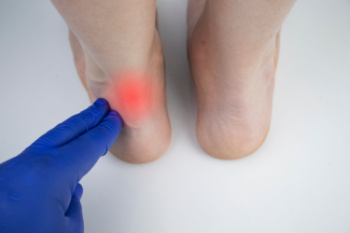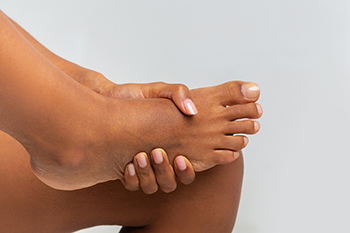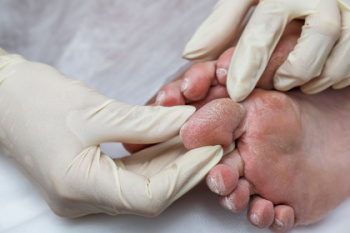
The Achilles tendon is the thick band of tissue that connects the calf muscles to the heel bone. It helps you walk, run, and jump by allowing your foot to push off the ground. Because it handles so much force, it can be injured through overuse, sudden movements, or lack of flexibility. When the tendon is strained or torn, healing can take time and depends on factors like blood flow, rest, and how the injury is treated. The tendon heals by forming new tissue, but this process is slower than in other areas of the body. Stretching, strengthening exercises, and targeted exercises often help the tendon recover. In more serious cases, surgery may be needed. If you notice pain or stiffness in the back of your ankle, it is suggested that you see a podiatrist for an accurate diagnosis and appropriate treatment.
Achilles tendon injuries need immediate attention to avoid future complications. If you have any concerns, contact Dawn Miles, DPM of Florida. Our doctor can provide the care you need to keep you pain-free and on your feet.
What Is the Achilles Tendon?
The Achilles tendon is a tendon that connects the lower leg muscles and calf to the heel of the foot. It is the strongest tendon in the human body and is essential for making movement possible. Because this tendon is such an integral part of the body, any injuries to it can create immense difficulties and should immediately be presented to a doctor.
What Are the Symptoms of an Achilles Tendon Injury?
There are various types of injuries that can affect the Achilles tendon. The two most common injuries are Achilles tendinitis and ruptures of the tendon.
Achilles Tendinitis Symptoms
- Inflammation
- Dull to severe pain
- Increased blood flow to the tendon
- Thickening of the tendon
Rupture Symptoms
- Extreme pain and swelling in the foot
- Total immobility
Treatment and Prevention
Achilles tendon injuries are diagnosed by a thorough physical evaluation, which can include an MRI. Treatment involves rest, physical therapy, and in some cases, surgery. However, various preventative measures can be taken to avoid these injuries, such as:
- Thorough stretching of the tendon before and after exercise
- Strengthening exercises like calf raises, squats, leg curls, leg extensions, leg raises, lunges, and leg presses
If you have any questions please feel free to contact one of our offices located in Palatka and Saint Augustine, FL . We offer the newest diagnostic tools and technology to treat your foot and ankle needs.

Foot pain can affect your daily life, especially when it involves the big toe or ball of the foot. Common causes include gout, bunions, and Morton’s neuroma. Gout is a type of arthritis caused by a buildup of uric acid, often resulting in sudden, intense pain, redness, and swelling, typically in the big toe. Bunions are bony bumps that form at the base of the big toe, leading to discomfort, stiffness, and difficulty walking. Morton’s neuroma involves thickening of tissue around a nerve in the ball of the foot, causing burning pain, tingling, or numbness between the toes. These conditions can make every step feel sharp, aching, or even electric. Wearing tight shoes or standing for long periods can worsen symptoms. A podiatrist can diagnose the cause of your foot pain through a physical exam and imaging. Treatment may include custom orthotics, medication, or minor procedures to relieve pain and restore comfort. If you have ongoing foot pain, it is suggested that you schedule an appointment with a podiatrist.
Foot Pain
Foot pain can be extremely painful and debilitating. If you have a foot pain, consult with Dawn Miles, DPM from Florida. Our doctor will assess your condition and provide you with quality foot and ankle treatment.
Causes
Foot pain is a very broad condition that could be caused by one or more ailments. The most common include:
- Bunions
- Hammertoes
- Plantar Fasciitis
- Bone Spurs
- Corns
- Tarsal Tunnel Syndrome
- Ingrown Toenails
- Arthritis (such as Gout, Rheumatoid, and Osteoarthritis)
- Flat Feet
- Injury (from stress fractures, broken toe, foot, ankle, Achilles tendon ruptures, and sprains)
- And more
Diagnosis
To figure out the cause of foot pain, podiatrists utilize several different methods. This can range from simple visual inspections and sensation tests to X-rays and MRI scans. Prior medical history, family medical history, and any recent physical traumatic events will all be taken into consideration for a proper diagnosis.
Treatment
Treatment depends upon the cause of the foot pain. Whether it is resting, staying off the foot, or having surgery; podiatrists have a number of treatment options available for foot pain.
If you have any questions, please feel free to contact one of our offices located in Palatka and Saint Augustine, FL . We offer the newest diagnostic and treatment technologies for all your foot care needs.

People with diabetes are at higher risk for foot infections due to poor circulation and reduced feeling in the feet. Small cuts, blisters, or sores can go unnoticed and quickly turn into serious infections if not treated. Signs of a diabetic foot infection include redness, swelling, warmth, pain, or drainage from a wound. Sometimes, there may be little pain even with a severe infection. A podiatrist will examine the foot carefully and may order tests such as X-rays or lab work to check for bone involvement or deeper tissue damage. Treatment depends on the severity of the infection and may include antibiotics, wound care, and sometimes surgical cleaning. Managing blood sugar levels and inspecting feet daily are key to preventing problems. Because diabetic foot infections can become dangerous quickly, it is suggested that you see a podiatrist at the first sign of a foot wound or infection.
Diabetic foot care is important in preventing foot ailments such as ulcers. If you are suffering from diabetes or have any other concerns about your feet, contact Dawn Miles, DPM from Florida. Our doctor can provide the care you need to keep you pain-free and on your feet.
Diabetic Foot Care
Diabetes affects millions of people every year. The condition can damage blood vessels in many parts of the body, especially the feet. Because of this, taking care of your feet is essential if you have diabetes, and having a podiatrist help monitor your foot health is highly recommended.
The Importance of Caring for Your Feet
- Routinely inspect your feet for bruises or sores.
- Wear socks that fit your feet comfortably.
- Wear comfortable shoes that provide adequate support.
Patients with diabetes should have their doctor monitor their blood levels, as blood sugar levels play such a huge role in diabetic care. Monitoring these levels on a regular basis is highly advised.
It is always best to inform your healthcare professional of any concerns you may have regarding your feet, especially for diabetic patients. Early treatment and routine foot examinations are keys to maintaining proper health, especially because severe complications can arise if proper treatment is not applied.
If you have any questions please feel free to contact one of our offices located in Palatka and Saint Augustine, FL . We offer the newest diagnostic and treatment technologies for all your foot and ankle needs.










